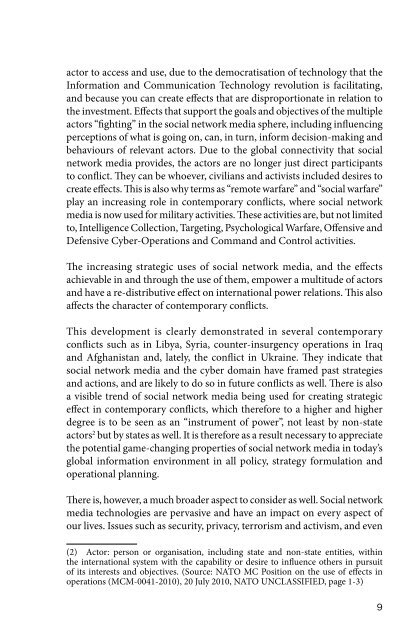The Weaponization of Social Media
The Weaponization of Social Media
The Weaponization of Social Media
You also want an ePaper? Increase the reach of your titles
YUMPU automatically turns print PDFs into web optimized ePapers that Google loves.
actor to access and use, due to the democratisation <strong>of</strong> technology that the<br />
Information and Communication Technology revolution is facilitating,<br />
and because you can create effects that are disproportionate in relation to<br />
the investment. Effects that support the goals and objectives <strong>of</strong> the multiple<br />
actors “fighting” in the social network media sphere, including influencing<br />
perceptions <strong>of</strong> what is going on, can, in turn, inform decision-making and<br />
behaviours <strong>of</strong> relevant actors. Due to the global connectivity that social<br />
network media provides, the actors are no longer just direct participants<br />
to conflict. <strong>The</strong>y can be whoever, civilians and activists included desires to<br />
create effects. This is also why terms as “remote warfare” and “social warfare”<br />
play an increasing role in contemporary conflicts, where social network<br />
media is now used for military activities. <strong>The</strong>se activities are, but not limited<br />
to, Intelligence Collection, Targeting, Psychological Warfare, Offensive and<br />
Defensive Cyber-Operations and Command and Control activities.<br />
<strong>The</strong> increasing strategic uses <strong>of</strong> social network media, and the effects<br />
achievable in and through the use <strong>of</strong> them, empower a multitude <strong>of</strong> actors<br />
and have a re-distributive effect on international power relations. This also<br />
affects the character <strong>of</strong> contemporary conflicts.<br />
This development is clearly demonstrated in several contemporary<br />
conflicts such as in Libya, Syria, counter-insurgency operations in Iraq<br />
and Afghanistan and, lately, the conflict in Ukraine. <strong>The</strong>y indicate that<br />
social network media and the cyber domain have framed past strategies<br />
and actions, and are likely to do so in future conflicts as well. <strong>The</strong>re is also<br />
a visible trend <strong>of</strong> social network media being used for creating strategic<br />
effect in contemporary conflicts, which therefore to a higher and higher<br />
degree is to be seen as an “instrument <strong>of</strong> power”, not least by non-state<br />
actors 2 but by states as well. It is therefore as a result necessary to appreciate<br />
the potential game-changing properties <strong>of</strong> social network media in today’s<br />
global information environment in all policy, strategy formulation and<br />
operational planning.<br />
<strong>The</strong>re is, however, a much broader aspect to consider as well. <strong>Social</strong> network<br />
media technologies are pervasive and have an impact on every aspect <strong>of</strong><br />
our lives. Issues such as security, privacy, terrorism and activism, and even<br />
(2) Actor: person or organisation, including state and non-state entities, within<br />
the international system with the capability or desire to influence others in pursuit<br />
<strong>of</strong> its interests and objectives. (Source: NATO MC Position on the use <strong>of</strong> effects in<br />
operations (MCM-0041-2010), 20 July 2010, NATO UNCLASSIFIED, page 1-3)<br />
9



